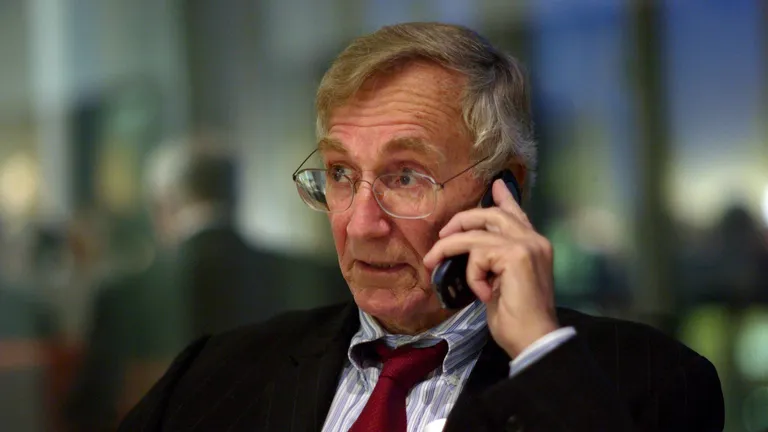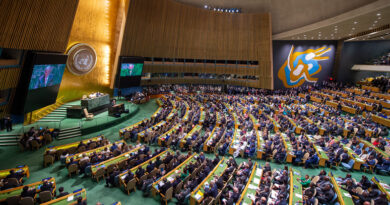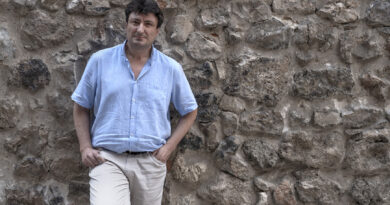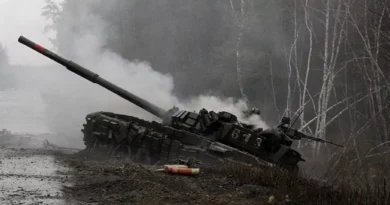Seymour Hersh: The notion that Europe can totally trust the US has evaporated
AMY GOODMAN AND JUAN GONZALEZ
Seymour Hersh talks in this interview about how the US decision to bomb the oil pipelines served to ensure the support of the allies in the war in Ukraine when some of them doubted. He says that this took away the option for Germany to reopen the gas pipeline and withdraw its support for kyiv in the conflict if things went wrong. The veteran and award-winning journalist highlights that Biden told Europe: "you are secondary" and considers that the political consequences for the United States will be "enormous" and will undermine NATO.
Amy Goodman: Can you tell us what you found in your research and what prompted you to do it? While there were many public comments, including from the Polish government saying, right after the bombing: "Thank you, America."
Symour Hersh: Well, first of all, I think the coverage can actually be described as a friend of mine did: I deconstructed the obvious. One only has to look at what the President of the United States said.
But of course there were also secret plans that I write about. A committee was formed. Jake Sullivan was directly involved. He was, and still is, the national security adviser. A team was formed to examine options to pressure the Russian government to withdraw.
These are normal operations: convene a committee to consider scenarios. It was clear that Russia would intervene in the Ukraine. The threat that the Russian president was going to make had not yet been made.
That was in December 2021, before New Year's Day. And the question within the advisory board, which included the usual representatives - the CIA, the National Security Agency (NSA), the Treasury Department, the State Department - met in a secret office building in the Building of Executive Offices in front of the White House. The choice was: do we want to do something concretely physical or not? In other words: sanctions or sabotage the pipeline, just as had been thought.
And the answer came quite quickly. The statement by Under Secretary of State Victoria Nuland was contained before President Biden spoke. That was at the end of January of last year. It came at a time when the panel was already involved: many experienced people in the intelligence community had concluded that a demolition could be attempted. The White House was told it was possible.
I think that led to Nuland's comments, which of course freaked out the insiders, because this was supposed to be a completely secret operation. It was a classified operation, none of the rules were to be followed for reporting to Congress.
And so they began their planning. They established contacts with Norway, an important ally of the United States. Norway is one of the first signatories to the 1949 NATO treaty. I think 19 nations were involved at the time. And Norway is a great ally of the United States.
We've spent hundreds of millions, probably more, close to a billion dollars, to improve the facilities there, which I detail in my article. Norway has a 1,400-mile border along the Atlantic coast, stretching from Oslo in Europe as far north as it meets the Russian border above the Arctic Circle.
The United States installed a series of devices in the north: a synthetic aperture radar, which has cost a fortune, to monitor Russian nuclear facilities in the area and also military activity on the other side of the Kola Peninsula.
The Norwegians are our close associates and they are excellent at doing underwater work. And that was what happened. The United States worked out a plan with them. It had to be clarified with Sweden and Denmark. I will leave it open whether they really believed, as explained to them, that the US would only do exercises in the Baltic Sea. But so far I haven't heard much from both countries.
The minelayers for the operation came from a base in a small Florida town. These mining crews within the Navy are very secret. They just do their job and don't talk. So they were the perfect people for the operation. You have trained for this. Every summer there was a big exercise by the US Sixth Fleet in Italy, which also has the rights to operate in the Baltic Sea. The Baltic Sea is an extremely large area.
The pipelines we are talking about here, Nord Stream 1, which came online in 2011, and Nord Stream 2, which has already been completed, are 750 miles long. And they go from Russia, which has huge amounts of gas - they have huge reserves in Siberia - directly to Germany.
Nord Stream 1 was a boon for the German economy and Western Europe. Russia produces so much gas at very low prices that the German government was able to resell some of the Russian-supplied gas at a profit, without Russia objecting.
The German economy is huge and flourishing. We know that Germany is good in the car business. But the country also has the world's largest chemical company, BASF. Now. blocking Russia is costing them dearly. Is It very cold there. There is a lot of anger.
BIDEN WANTED TO HAVE THE CAPACITY TO DO IT AT ANY TIME
Juan González: Sy, I wanted to ask you, regarding the lack of… I always thought, when it was claimed that Russia had potentially sabotaged their own pipeline, that it was ridiculous to think that that was the case, that they would invest so much money in pipelines and then bomb them themselves . But I am interested in the lack of attention from the press since the sabotage took place, and also the lack of attention from Congress. I am thinking of the CIA mining of the Managua ports in the early 1980s under the Reagan administration, when the conservative Republican head of the Senate Intelligence Committee, Barry Goldwater, opposed it and raised concerns that It was a sting operation in which Congress was not notified. And then, of course, Congress cut aid to the Contras. As a result, there was a judgment of the International Court of Justice against the United States. But in this case, this type of sabotage, the media seems not at all interested in finding out what happened here, like you, or, in Congress, there is no one in Congress who has raised questions.
Symour Hersh: One terrible event after another is happening. The news is full of it. I think the world has taken a very strange turn. It doesn't matter what I think. There is no question that the press has been polarized since Trump took office. Now we're on two sides: you know, right, left, Democrat, Republican, whatever you describe it.
the people you see Fox News does not watch MSNBC , etc. And if you read the New York Times , you will not understand what the right hears. You know, the conservatives are after the New York Times and The Washington Post because of his, I quote, “liberal” views. A polarization occurs.
And right now we have a president, a Democratic president, who has done some good things nationally, but I can tell you that I don't understand the whole commitment to Ukraine.
I don't understand what I'm reading, although of course I have access to many people who see through various things. I've been doing this for so long. The bottom line is that the stories I've heard about the war, especially since the fall, and that's where it gets interesting, are pretty grim. I think the end is just a matter of time. At the moment, it's about how many of his own people Zelenskyy wants to kill. He will soon be finished.
What happened is that the plan was to plant the bomb, and I can't answer your philosophical question about why Congress doesn't do anything anymore. Congress is just as polarized. And there is also an ongoing tremendous hatred of anything Putin is in this country. Foreign policy disagreements are one thing, but the personal level matters here, which doesn't help. I don't think Putin wants to take over Europe. He wants to have Ukraine tamed, but he is not interested in doing anything else. He may be in the minority when it comes to that.
Anyway, there was an exercise in June and the bombs were planted in the pipelines under the guise of a NATO exercise. Many different countries were there with divers and they blew things up. It was an exercise to find mines. There had never been anything like it there.
Whoever it was from the CIA or other agencies who came up with it should be praised, because they were pretty ingenious. In that exercise, the divers went down, they did what they were trained to do. They are very good. C4 Plastic Explosive was used, a couple hundred bombs, whatever the weight, enough to blow up most cities, most buildings in Washington and maybe a few in New York. The divers did their job well.
But the president, at the last minute, hesitated, fearing that blowing it up right after the exercise would point to the United States. And so he wanted to have the ability to do it at any time, and that caused a huge problem on the team. Secret service people are very demanding. Simply put, blowing up a pipeline made sense to them. Blowing up an oil pipeline owned by a division of Gazprom, which owns 51 percent of the shares. That's the Russian oligarchs. Forty-nine percent of Nord Stream 1 is owned by four Western European companies that trade the gas.
The secret service people saw the threat justified. And if you wanted to do that during an exercise, then that was fine with them.
They finally got the message at the end of September. I don't think they were really convinced that Biden was going to blow up the main pipeline, Nord Stream 2, at that point. It was a newly laid pipeline that had just been completed. Since it already had a permit from the German government, it was filled with gas. That's why so much of it leaked. The pipeline contained 750 miles of methane gas.
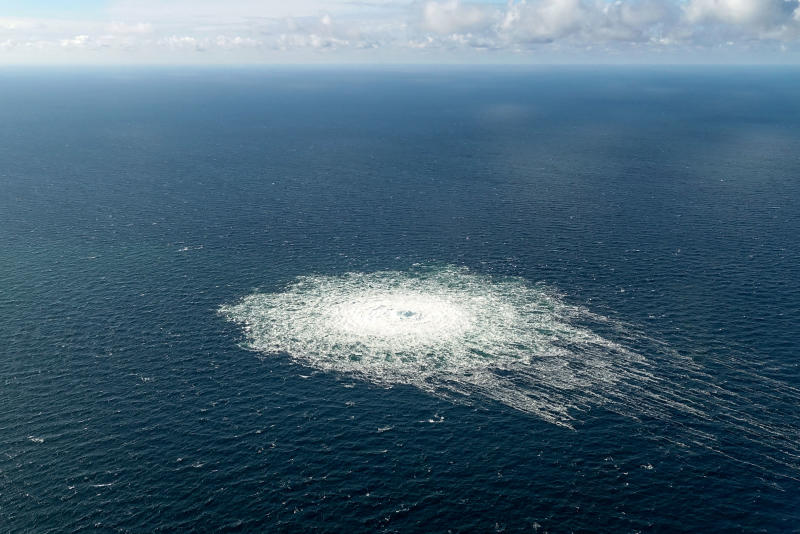
The US REMOVED THE OPTION FROM GERMANY TO REOPEN THE GAS PIPELINE
This is what Biden did. And that, I think, is the real point of the story, why so many people, even the intelligence community, are very concerned about it. What he did was say: “I am in a big war with the Ukraine. It doesn't look good. I want to be sure to get the support of Germany and Western Europe. And I know winter is coming, and if it's going to be bad, I don't want the Germans to say, 'We have to pull out, because we're going to be slaughtered because we can't get cheap fuel anymore and our economy is collapsing. We will withdraw and open the gas pipeline”. Which they could do. So he took that option away from them.
Americans have been talking about Europe's dependence on Russia since the first pipeline, Nord Stream 1, came online in 2011. It was a big topic even before it was built, back to the Bush-Cheney years.
I covered a lot about it for the The New Yorker . That's when people started talking about the threat: the threat of cheap Russian energy to Europe. This would make trade with Russia ever more pleasant and easy for Europe. The United States, on the other hand, wanted to isolate Russia more and more. That has been the theme of the past decades.
John Gonzalez: He has been criticized at times for many of his revelations. Now there are people who say that the recent revelation of him is not very well documented, that it is essentially based on one source: an inside source, an unnamed source. How do you respond to criticism that the story is less documented than previous revelations from him?
Symour Hersh: Before I get to that, let me finish my thought because it's a very important thought. The fear was that Europe would withdraw from the war. Well, what Biden did was tell Europe, "You're secondary." The consequences for Europeans will be dire. The notion that they can totally trust the United States, even in a crisis, has evaporated.
I think it will undermine NATO, which has always seemed completely useless to me. I know people who now pay five times as much for electricity. People pay three or four times more for gasoline. There is not enough. It has become very expensive. It's colder now than it was in the fall. They had a mild fall due to climate change.
The political consequences for us in the United States will be enormous. Biden and his people in the White House deny the story, a denial that part of the press accepts. I don't know why my old newspaper, the New York Times , doesn't cover it extensively instead relying on a denial and ignoring the story.
the same for him The Washington Post . I think it will have long-term political consequences for us, considering that some countries might even leave NATO. It baffles me that Biden thinks it's less important that people be cold than that he continue a war he won't win.
I WILL NOT REVEAL MY SOURCES. I HAVE BEEN IN CONTACT WITH INSIDE INFORMATION FOR 40 YEARS
As for the source question, I've been doing this for a long time. It doesn't bother me that the United States government is attacking me and that my old newspaper, the New York TimesI haven't written a word about it. That's why people like me are in Substacks , where they make their own publications. I don't have to worry about censorship or editorial restrictions.
But I won't reveal my sources. I'm just lucky. I've been in contact with insiders for 20, 30, 40 years who are not only loyal to what they do, but also not afraid to be critical. So these are the kind of sources that reporters dream of. And I've always had people like that. And I keep them.
Yes, they criticized me a lot. One of the criticisms comes from the people in the open source groups at OSINT (Open Source Intelligence), which are in a large part of the world now. There are people who monitor air traffic, shipping and all that. Two or three groups have issued a statement saying that nothing they see matches my story. Well, if you're in the intelligence community, you've been running covert operations for many years. The United States is working very closely with the Norwegians on this, who, by the way, have increased their oil exports to Europe by doubling their profits. I don't know the figures but at least more than double thanks to the failure of the gas pipeline.
The intelligence services, of course, have taken it upon themselves to take care of the open source people, to make them believe that what happened didn't happen. It's so obvious, to me, but not to them.
The reason why I have talked so much about what could happen in NATO and in Europe when Biden says to Western Europe and Germany: “We prefer to keep our war and you can be cold”, is because that could incite some countries to say, “Maybe we can get out of there. Why do we need NATO, and US support, when, in a crisis, our ability to keep our people warm is taken away?
The Green Party did very well in the elections. The foreign minister is from the Green Party. But events could lead to a widespread conservative move in politics. What we did after World War II was fantastic. We have helped rebuild a modern democratic diversity, pluralistic society in Europe. I think it could lead to that, it's not going to go as far as it did in Italy. But it could result in some conservative victories and legislation. Europe has always lacked natural resources, it has always had to depend on others. And among those others were the US and also Russian gas. And if we stop that, we do so at a political cost.
ONE OF THE STUPIDEST THINGS THE US HAS DONE IN YEARS
There is much more to say about this, I will keep writing about it. Blowing up pipelines is, also according to some of the people involved, one of the dumbest things the US government has done in years, and we've had Trump for four years. In the long run, I just don't understand why good newspapers like the New York Times , which I still read, they act the way they do.
I don't believe everything they write about Ukraine, but they still have wonderful reporters. The problem is the editors. My take on publishers is: if we got rid of 90 percent of the world's publishers, we'd be much better off. I've always thought so, ever since I started working as a reporter.
So I don't care what they say. If I took it seriously, I would cry because some of them are so stupid. It's just stupid. Ned Price speaks for the Biden administration, he is paid for his work. I don't blame him.
He really knows about the secret services. He has had a run on them. And from what I know, he's a perfectly decent man. I know people who know him personally. He's a good guy. They just told him what to say and he said it.
You have to take into account what Secretary of State Anthony Blinken said. After the September bombing, he told a free press conference: "One good thing is that Russia will no longer be able to use gas as a weapon."
That Russia can use gas as a weapon against Western Europe to put itself in a special light and weaken our power, authority and economic ability to control Western Europe has been a big problem in this country for two decades. It is not a new topic. Russian oil and gas have always terrified Washington.
Juan González: The Norwegian Government claims that one of the ships you mentioned in your article that was involved in the planning or preparation of the exercise was not there at the time of those exercises. What do you think of Norway's denial?
Seymour Hersh: Let me start with a reference to Nicaragua first. The CIA people operating in Nicaragua were delighted and excited. There are beaches there. And even in the worst days of the Sandinista movement, they would take their little motorboats to the beaches and bombard them with small arrow fragmentation projectiles. They just shot at the beaches, knowing there would be casualties. He just did it and they had a lot of fun talking about it and showing off. I mean, that's the kind of thing you get into when you're running a covert operation.
The Norwegian government did not just provide a ship involved in the operation. It also had a compression chamber that was mounted on the ship by the CIA, because the ship was only equipped for hunting submarines. The divers had to dive to a depth of 260 feet, which is 80 meters. The Norwegians were looking for the shallowest part of the Baltic Sea, located off an island that lies between Sweden and Denmark. That's where they did their exercises. However, the depth where land mines had to be placed was up to 260 feet deep. The pipes are steel lined with concrete shields. So it is a difficult task to destroy them. At a depth of 260 feet, without a compression chamber, divers have to climb every 90 feet. They breathe oxygen, nitrogen and helium. That's pretty amazing to me. Now they could surface.
THE PRESIDENT OF THE US WILL HAVE TO ADMIT IT
The operation was called “Alta”. The Norwegian ship was there. It is a stupid lie to deny that. The ship didn't have to stay there either. Divers could just jump in. A long recovery period was not necessary.
At a certain point, they reappeared. The time for this has been set. A timer was set so that the divers could reach the surface. You don't prepare an explosive and detonate it in five minutes, you take your time.
The divers then surfaced and were picked up again. Everything could have happened much faster than you think. While not an officially listed ship item, there was a decompression chamber on the ship. It was placed there by the CIA, who took it on a plane.
It was a brilliant trade if you look at it from a classic trading perspective. They got away with keeping it a secret. The purpose was to make the threat credible.
Then the US President and Assistant Secretary of State finally got word that it could be done. And they thought they should stop talking about it, which was disappointing for the people involved. So, in a week or two, it happened. I have been accused of making it up. But the president did. And he will have to admit it.
I receive many messages. They come from all over the world, from different countries. Substack is an amazing platform. The article received over a million hits in one day. People text me: “Thank God. We miss the kind of reporting you and others do. We don't see them anymore."
Amy Goodman is the host and executive producer of Democracy Now, an independent US daily news program broadcast on more than 1.400 television and radio channels worldwide.
Juan González He is a co-anchor of Democracy Now and Professor of Journalism at Rutgers University (USA). He is a two-time recipient of the George Polk Opinion Journalism Award. He was founder and president of the National Association of Hispanic Journalists of the United States.
This interview is published in collaboration with the American news program Democracy Now

